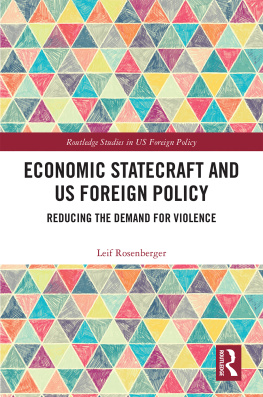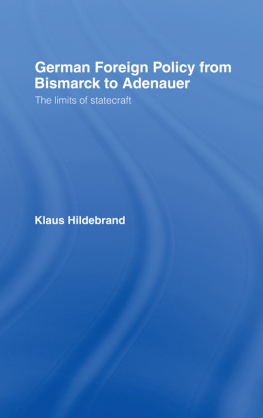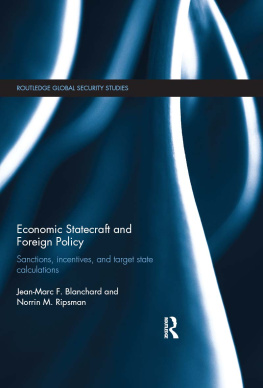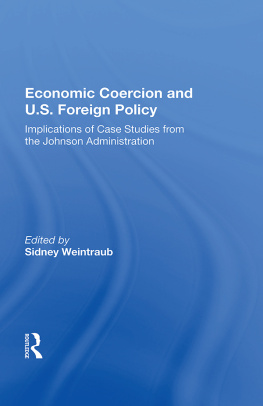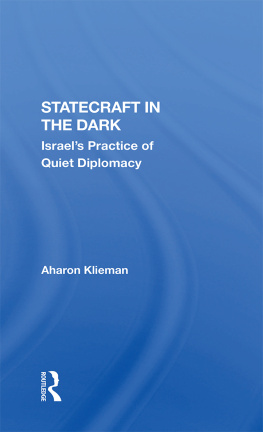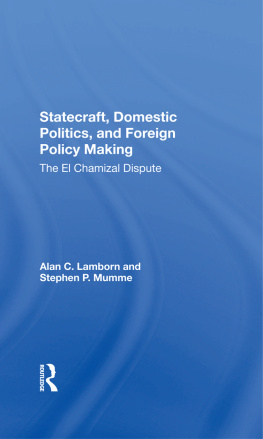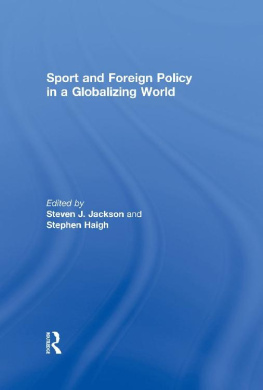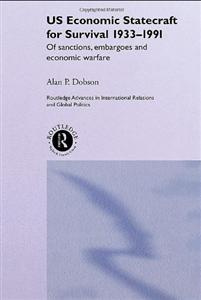Economic Statecraft and US Foreign Policy
Explaining the connection between economics and violent extremism, this book argues that American foreign policy must be rebalanced with a greater emphasis on social inclusion and shared prosperity in order to mitigate the root causes of conflict.
Rosenberger argues that economic coercion has usually proven counterproductive, and that a militarized American foreign policy too often results in frustration and strategic failure. He analyses this theory through a number of case studies, from the Treaty of Versailles to the more recent issues of Israel in Gaza, US sanctions against Iran, the US-backed, Saudi-led boycott of Qatar and Donald Trumps trade war against China. He concludes that the economic logic of social inclusion and shared prosperity demonstrated in Jean Monnets European Coal and Steel Community would be a more successful strategy in reducing the demand for violence in the civil wars in Afghanistan, Iraq, Yemen and Syria.
This book will be of particular relevance for courses on American Foreign Policy, International Relations and International Political Economy and seminars on the Near East and South Asia. Professional economists, diplomats and military officers in America and in the Near East and South Asia will also find the argument useful.
Dr. Leif Rosenberger retired from the US government in March 2016 after a 35-year career as a practitioner, scholar and educator. He was a Full Professor of Economics at the US Army War College, where he also held the General Douglas MacArthur Academic Chair of Research in the Strategic Studies Institute.
Routledge Studies in US Foreign Policy
Edited by Inderjeet Parmar, City University, and John Dumbrell, University of Durham
This new series sets out to publish high-quality works by leading and emerging scholars critically engaging with United States Foreign Policy. The series welcomes a variety of approaches to the subject and draws on scholarship from international relations, security studies, international political economy, foreign policy analysis and contemporary international history.
Subjects covered include the role of administrations and institutions, the media, think tanks, ideologues and intellectuals, elites, transnational corporations, public opinion, and pressure groups in shaping foreign policy, US relations with individual nations, with global regions and global institutions and Americas evolving strategic and military policies.
The series aims to provide a range of books from individual research monographs and edited collections to textbooks and supplemental reading for scholars, researchers, policy analysts and students.
US Democracy Promotion after the Cold War
Stability, Basic Premises, and Policy towards Egypt
Annika Elena Poppe
Kissinger, Angola and US-African Foreign Policy
The Unintentional Realist
Steven OSullivan
North Korea US Relations
From Kim Jong-il to Kim Jong-un, 2nd edition
Ramon Pacheco Pardo
Economic Statecraft and US Foreign Policy
Reducing the Demand for Violence
Leif Rosenberger
For more information about this series, please visit: www.routledge.com/series/RSUSFP
Economic Statecraft and US Foreign Policy
Reducing the Demand for Violence
Leif Rosenberger
First published 2020
by Routledge
2 Park Square, Milton Park, Abingdon, Oxon OX14 4RN
and by Routledge
52 Vanderbilt Avenue, New York, NY 10017
Routledge is an imprint of the Taylor & Francis Group, an informa business
2020 Leif Rosenberger
The right of Leif Rosenberger to be identified as author of this work has been asserted by him in accordance with sections 77 and 78 of the Copyright, Designs and Patents Act 1988.
All rights reserved. No part of this book may be reprinted or reproduced or utilised in any form or by any electronic, mechanical, or other means, now known or hereafter invented, including photocopying and recording, or in any information storage or retrieval system, without permission in writing from the publishers.
Trademark notice: Product or corporate names may be trademarks or registered trademarks, and are used only for identification and explanation without intent to infringe.
British Library Cataloguing-in-Publication Data
A catalogue record for this book is available from the British Library
Library of Congress Cataloging-in-Publication Data
Names: Rosenberger, Leif, author.
Title: Economic statecraft and US foreign policy : reducing the demand for violence / Leif Rosenberger.
Other titles: Economic statecraft and United States foreign policy Description: Abingdon, Oxon ; New York, NY : Routledge, 2020. |
Series: Routledge studies in US foreign policy | Includes bibliographical references and index.
Identifiers: LCCN 2019028171 (print) | LCCN 2019028172 (ebook) |
ISBN 9780367134204 (hardback) | ISBN 9780429026362 (ebook)
Subjects: LCSH: United StatesForeign relationsMiddle East. |
Middle EastForeign relationsUnited States. | United
StatesForeign relationsChina. | ChinaForeign relationsUnited States. | Middle EastEconomic conditions21st century. | ChinaEconomic conditions21st century. |
Security, InternationalEconomic aspects. | Political violenceEconomic aspects.
Classification: LCC JZ1480.A55 R67 2020 (print) | LCC JZ1480.A55 (ebook) | DDC 327.1/110973dc23
LC record available at https://lccn.loc.gov/2019028171
LC ebook record available at https://lccn.loc.gov/2019028172
ISBN: 978-0-367-13420-4 (hbk)
ISBN: 978-0-429-02636-2 (ebk)
Typeset in Times New Roman
by codeMantra
This book is dedicated to my wife Regina, the love of my life. Her patience and understanding made this book possible. In addition, I was fortunate along the way to be part of wonderful learning communities consisting of the brave military officers and civilians I had the honor of teaching at the US Army War College and serving with at the Strategic Studies Institute, the US Central Command, the US Pacific Command, the US Central Intelligence Agency and the US Defense Intelligence Agency for 35 years in the US Civil Service.
Dr. Leif Rosenberger retired from US government in March 2016 after a 35-year career as a practitioner, scholar and educator. He was a Full Professor of Economics at the US Army War College, where he also held the General Douglas MacArthur Academic Chair of Research in the Strategic Studies Institute. In addition, he was the Chief Economist at the US Pacific Command (PACOM) and the US Central Command (CENTCOM) and an analyst at the US Central Intelligence Agency (CIA) and the US Defense Intelligence Agency (DIA).
In February 2018, Dr. Rosenberger was promoted to Chief Economist at ACERTAS, a think tank in Los Angeles that performs economic, political and military risk assessments. His services are also in demand as the Head of the Global Division at the Global Economic Institute in Ottawa; as Editor and Contributor at Roubini Global Economics in New York; as an Executive Director at Paragon Worldwide Group in Gig Harbor, Washington and as a Director at Think Renewables Group and Thank-Biz Africa in Toronto.


